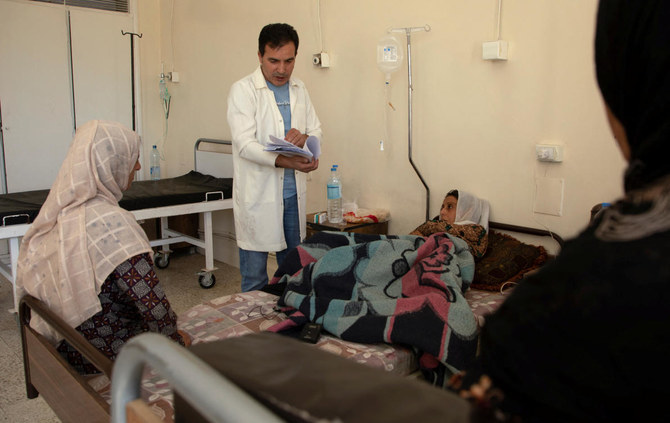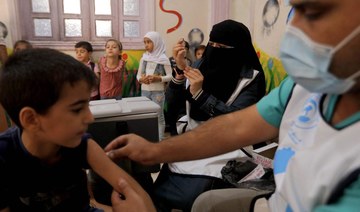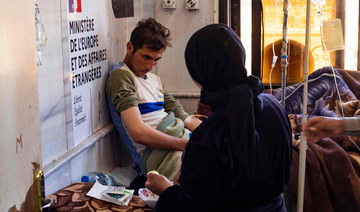IDLIB/HASAKA, Syria: A cholera outbreak that has claimed 29 lives in Syria is posing a danger across the frontlines of the country’s 11-year-long war, stirring fears in crowded camps for the displaced who lack running water or sewage systems.
First linked to contaminated water near the Euphrates river, the outbreak has now spread across the fractured nation, with cases reported in government- and rebel-controlled regions. In all, at least 2,000 cases have been reported so far.
“How am I not supposed to catch cholera with the sewage running right next to our tent?” said Sobha Al-Jadoue, 60, who lives in a camp for displaced people in the rebel-held Idlib region. “We can no longer sleep or sit because of the smells. A few days ago the sewage spilled into my tent.”
Cholera is spread by the ingestion of contaminated food or water and can cause acute diarrhea. While most of those affected will have mild or no symptoms, cholera can kill within hours if untreated, the World Health Organization website says.
The devastation wrought by the Syrian conflict has left the country particularly vulnerable, demolishing much of the infrastructure including water pumping and treatment plants.
Climate change has worsened water shortages.
“Because of the war there has been great destruction of the health infrastructure and infrastructure in general, so if it spreads in these areas — especially in the camps — it could have a grave health impact and kill a lot of people,” said Shahem Mekki, who runs a disease monitoring center in the area.
The war has killed some 350,000 people since it spiralled out of an uprising against President Bashar Assad in 2011. The World Health Organization says 55 percent of health care facilities in the country are not functioning because of the war.
The first cholera cases were detected on Sept. 5 in Deir Ezzor province, before spreading to other areas including the cities of Raqqa and Hasaka, said Jawan Mustafa, health director in the Kurdish-run administration of northeastern Syria.
He said there were more than 4,350 suspected cases of cholera in northeastern Syria, and 100 confirmed cases. “The cases are increasing but, fortunately, slowly,” he said.
Amshah Shehade, 45, said she brought her daughter to hospital in Hasaka due to diarrhea and dizziness, and that her grandchild had suffered the same symptoms. “It was caused by contaminated tank water,” she said.
Public awareness campaigns are underway on the causes, symptoms and prevention of cholera.
Eva Hinds, chief of communication at the United Nations children’s agency, UNICEF, in Syria, said the agency and its partners had scaled up water trucking and chlorination in the cholera hot spots to ensure access to clean water.
“It’s time to act now. We are investing heavily in measures to prevent the further spread,” she said.
In Syria, mounting cholera cases pose threat across frontlines
https://arab.news/8xsua
In Syria, mounting cholera cases pose threat across frontlines

- Cholera is spread by the ingestion of contaminated food or water and can cause acute diarrhea
- Public awareness campaigns are underway on the causes, symptoms and prevention of cholera
Gaza baby rescued from dead mother’s womb dies

- Doctors were able to save the baby, delivering her by Caesarean section
- The baby suffered respiratory problems and a weak immune system, said Doctor Mohammad Salama who had been caring for Sabreen Al-Rouh
RAFAH, Gaza Strip: A baby girl who was delivered from her dying mother’s womb in a Gaza hospital following an Israeli airstrike has herself died after just a few days of life, the doctor who was caring for her said on Friday.
The baby had been named Sabreen Al-Rouh. The second name means “soul” in Arabic.
Her mother, Sabreen Al-Sakani (al-Sheikh), was seriously injured when the Israeli strike hit the family home in Rafah, the southernmost city in the besieged Gaza Strip, on Saturday night.
Her husband Shukri and their three-year-old daughter Malak were killed.
Sabreen Al-Rouh, who was 30-weeks pregnant, was rushed to the Emirati hospital in Rafah. She died of her wounds, but doctors were able to save the baby, delivering her by Caesarean section.
However, the baby suffered respiratory problems and a weak immune system, said Doctor Mohammad Salama, head of the emergency neo-natal unit at Emirati Hospital, who had been caring for Sabreen Al-Rouh.
She died on Thursday and her tiny body was buried in a sandy graveyard in Rafah.
“I and other doctors tried to save her, but she died. For me personally, it was a very difficult and painful day,” he told Reuters by phone.
“She was born while her respiratory system wasn’t mature, and her immune system was very weak and that is what led to her death. She joined her family as a martyr,” Salama said.
More than 34,000 Palestinians, many of them women and children, have been killed in the six-month-old war in Gaza between Israel and Hamas militants, according to the Gaza health ministry. Israel denies deliberately targeting civilians in its campaign to eradicate Hamas.
Much of Gaza has been laid to waste by Israeli bombardments and most of the enclave’s hospitals have been badly damaged, while those still operating are short of electricity, medicine sterilization equipment and other supplies.
“(Sabreen Al-Rouh’s) grandmother urged me and the doctors to take care of her because she would be someone that would keep the memory of her mother, father and sister alive, but it was God’s will that she died,” Salama said.
Her uncle, Rami Al-Sheikh Jouda, sat by her grave on Friday lamenting the loss of the infant and the others in the family.
He said he had visited the hospital every day to check on Sabreen Al-Rouh’s health. Doctors told him she had a respiratory problem but he did not think it was bad until he got a call from the hospital telling him the baby had died.
“Rouh is gone, my brother, his wife and daughter are gone, his brother-in-law and the house that used to bring us together are gone,” he told Reuters.
“We are left with no memories of my brother, his daughter, or his wife. Everything was gone, even their pictures, their mobile phones, we couldn’t find them,” the uncle said.
UN denounces ‘more serious’ Iran crackdown on women without veils

- Hundreds of businesses including restaurants and cafes have been shut down for not enforcing the hijab rule
- More women began refusing the veil in the wake of the 2022 death in custody of 22-year-old Mahsa Amini
GENEVA: The United Nations said Friday that it was concerned by reports of new efforts to track and punish Iranian women, some as young as 15, who refuse to wear the headscarf required under the country’s Islamic law.
The UN Human Rights Office also expressed alarm about a draft bill on “Supporting the Family by Promoting the Culture of Chastity and Hijab,” which would impose tougher sentences on women appearing in public without the hijab.
“What we have seen, what we’re hearing is, in the past months, that the authorities, whether they be plainclothes police or policemen in uniform, are increasingly enforcing the hijab bill,” Jeremy Laurence, a spokesman for the office, said at a press conference.
“There have been reports of widespread arrests and harassment of women and girls — many between the ages of 15 and 17,” he said.
Iranian police announced in mid-April reinforced checks on hijab use, saying the law was increasingly being flouted.
Hundreds of businesses including restaurants and cafes have been shut down for not enforcing the hijab rule, and surveillance cameras are being used to identify women without it, Laurence said.
More women began refusing the veil in the wake of the 2022 death in custody of 22-year-old Mahsa Amini after her arrest by Iran’s morality police for allegedly breaking the headscarf law, which sparked a wave of deadly protests against the government.
Laurence said that on April 21, “the Tehran head of the Islamic Revolutionary Guard Corps announced the creation of a new body to enforce existing mandatory hijab laws, adding that guard members have been trained to do so ‘in a more serious manner’ in public spaces.”
And while the latest draft of the new hijab bill has not been released, “an earlier version stipulates that those found guilty of violating the mandatory dress code could face up to 10 years’ imprisonment, flogging, and fines,” he said, adding that “this bill must be shelved.”
The Human Rights Office also called for the release of a rapper sentenced to death for supporting nationwide protests sparked by Amini’s death.
Toomaj Salehi, 33, was arrested in October 2022 for publicly backing the uprising.
“All individuals imprisoned for exercising their freedom of opinion and expression, including artistic expression, must be released,” Laurence said.
UN seeks to deescalate Sudan tensions amid reports of possible attack

- UN Secretary-General Antonio Guterres’ envoy is engaging with all parties to deescalate tensions
UNITED NATIONS: The United Nations is increasingly concerned about escalating tensions in Al-Fashir in Sudan’s North Dafur region amid reports that the Rapid Support Forces are encircling the city, signaling a possible imminent attack, the UN’s spokesperson said on Friday.
UN Secretary-General Antonio Guterres’ envoy is engaging with all parties to deescalate tensions in the area, the spokesperson said.
Israeli army says missile fire kills civilian near Lebanon

- The violence has fueled fears of all-out conflict between Iran-backed Hezbollah and Israel
- “Overnight, terrorists fired anti-tank missiles toward the area of Har Dov in northern Israel,” the Israeli army said
JERUSALEM: The Israeli army said Friday a civilian was killed near the country’s northern border with Lebanon, as near-daily exchanges of fire with Hezbollah rage.
Both sides have stepped up attacks this week, with Hezbollah increasing rocket fire and Israel saying it had carried out “offensive action” across southern Lebanon.
The violence has fueled fears of all-out conflict between Iran-backed Hezbollah and Israel, which last went to war in 2006.
“Overnight, terrorists fired anti-tank missiles toward the area of Har Dov in northern Israel,” the Israeli army said, referring to the disputed Shebaa Farms district.
“As a result, an Israeli civilian doing infrastructure work was injured and he was later pronounced dead.”
Israeli media reported that the victim was an Arab-Israeli truck driver. Police told AFP they had not identified the body, but said it was the only one found after a truck was hit.
Hezbollah said it had destroyed two Israeli vehicles in the Kfarshuba hills overnight in a “complex ambush” on a convoy using missiles and artillery.
The Israeli army did not comment directly on the claim.
It said Israeli fighter jets struck Hezbollah targets around Shebaa village in southern Lebanon including a weapons store and a launcher, while soldiers “fired to remove a threat in the area.”
It said fighter jets also “struck Hezbollah operational infrastructure in the area of Kfarshuba and a military compound in the area of Ain El Tineh in southern Lebanon.”
Lebanon’s official National News Agency reported that Shebaa village, Kfarshuba and Helta were targeted by “more than 150 Israeli shells,” leaving homes damaged.
Iran-backed Hezbollah has been trading almost-daily fire with the Israeli army since the day after its Palestinian ally Hamas carried out an unprecedented attack on Israel on October 7.
Since October 8 at least 380 people have been killed in Lebanon, including 252 Hezbollah fighters and dozens of civilians, according to an AFP tally.
Israel says 11 soldiers and nine civilians have been killed on its side of the border.
Tens of thousands of people have been displaced on both sides.
EU commits $73 million more for Gaza aid

- New EU aid would be focused on food deliveries, clean water, sanitation and shelters
- The EU and United States have demanded that Israel allows more aid into Gaza
BRUSSELS: The European Union on Friday said it was giving an extra 68 million euros ($73 million) to provide desperately needed aid to Palestinians in Gaza.
The territory has been devastated by more than six months of Israeli bombardment and ground operations after Hamas’s October 7 attack, leaving the civilian population of two million people in need of humanitarian assistance to survive.
“In light of the continued deterioration of the severe humanitarian crisis in Gaza, and the steady rise of needs on the ground, the (European) Commission is stepping up its funding to support Palestinians affected by the ongoing war,” an EU statement said.
“This support brings total EU humanitarian assistance to 193 million euros for Palestinians in need inside Gaza and across the region in 2024.”
The EU said the new aid would be focused on food deliveries, clean water, sanitation and shelters, and would be channelled through local partners on the ground.
The United Nations has said Israel’s operation has turned Gaza into a “humanitarian hellscape,” amid fears of a looming famine.
The EU and United States have demanded that Israel allows more aid into Gaza.
The US military said on Thursday it had begun construction of a pier meant to boost deliveries to the territory.
The war in Gaza began with an unprecedented Hamas attack on Israel on October 7 that resulted in the deaths of about 1,170 people in Israel, according to an AFP tally of Israeli official figures.
Israel vowed to destroy Hamas, with a retaliatory offensive that has killed at least 34,356 people in Gaza, mostly women and children, according to the Hamas-run territory’s health ministry.






















